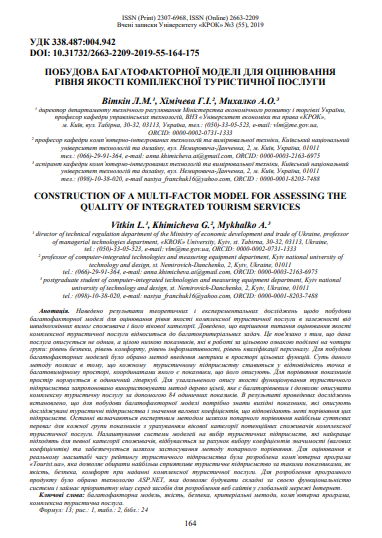ПОБУДОВА БАГАТОФАКТОРНОЇ МОДЕЛІ ДЛЯ ОЦІНЮВАННЯ РІВНЯ ЯКОСТІ КОМПЛЕКСНОЇ ТУРИСТИЧНОЇ ПОСЛУГИ
DOI:
https://doi.org/10.31732/2663-2209-2019-55-164-175Ключові слова:
багатофакторна модель, якість, безпека, критеріальні методи, комп’ютерна програма, комплексна туристична послугаАнотація
Наведено результати теоретичних і експерементальних досліджень щодо побудови багатофакторної моделі для оцінювання рівня якості комплексної туристичної послуги в залежності від швидкозмінних вимог споживача і його вікової категорії. Доведено, що вирішення питання оцінювання якості комплексної туристичної послуги відноситься до багатокритеріальних задач. Це пов'язано з тим, що дана послуга описується не одним, а цілою низкою показників, які в роботі за цільовою ознакою поділені на чотири групи: рівень безпеки, рівень комфорту, рівень інформативності, рівень кваліфікації персоналу. Для побудови багатофакторних моделей було обрано метод введення метрики в просторі цільових функцій. Суть даного методу полягає в тому, що кожному туристичному підприємству ставиться у відповідність точка в багатовимірному просторі, координатами якого є показники, що його описують. Для порівняння показників простір нормується в одиничний гіперкуб. Для узагальненого опису якості функціонування туристичного підприємства запропоновано використовувати метод дерево цілей, яке є багаторівневим і дозволяє описувати комплексну туристичну послугу за допомогою 84 одиничних показиків. В результаті проведених досліджень встановлено, що для побудови багатофакторної моделі потрібно знати вихідні показники, які описують досліджувані туристичні підприємства і значення вагових коефіцієнтів, що відповідають меті порівняння цих підприємств. Останні визначаються експертним методом шляхом попарного порівняння найбільш суттєвих переваг для кожної групи показників з урахуванням вікової категорії потенційних споживачів комплексної туристичної послуги. Налаштування системи моделей на вибір туристичних підприємств, які найкраще підходять для певної категорії споживачів, відбувається за рахунок вибору коефіцієнтів значимості (вагових коефіцієнтів) та забезпечується шляхом застосування методу попарного порівняння. Для оцінювання в реальному масштабі часу рейтингу туристичного підприємства була розроблена комп’ютерна програма «Tourist.ua», яка дозволяє обирати найбільш сприятливе туристичне підприємство за такими показниками, як якість, безпека, комфорт при наданні комплексної туристичної послуги. Для розроблення програмного продукту було обрано технологію ASP.NET, яка дозволяє будувати складні за своєю функціональністю системи і займає пріоритетну нішу серед засобів для розроблення веб сайтів у глобальній мережі Інтернет.
Завантаження
Посилання
Saghier N. M. E. Managing service quality: dimensions of service quality: a study in Egypt. Research Journal of Business Management. № 1. 2013. pp. 82-9.
Mihail Titu, Răulea A., Ţîţu S. Measuring Service Quality in Tourism Industry. Procedia - Social and Behavioral Sciences. 2016. pp. 294-301.
Shafiq Ali, Mostafiz I., Taniguchi M. Using SERVQUAL to determine Generation Y’s satisfaction towards hoteling industry in Malaysia. Journal of Tourism Futures. 2019. № 5. pp. 62-74.
Nelson K. F., Louisa Yee-Sum Lee, Hailin Qu Tsang Service quality research on China’s hospitality and tourism industry. International Journal of Contemporary Hospitality Management. 2015. № 27 (3). pp. 473-497.
Minghetti Valeria, Celotto E. Measuring Quality of Information Services: Combining Mystery Shopping and Customer Satisfaction Research to Assess the Performance of Tourist Offices. Journal of Travel Research. 2014. № 53(5). pp. 565-580.
Chi Junwook Employment and wage sensitivity to tourism activities - the case of US tourist arrivals and expenditure in Hawaii. Tourism Economics. 2016. № 22 (1). pp. 171-178.
Kim H. L., Woo E. J., Uysal M. Tourism experience and quality of life among elderly tourists. Tourism Management. 2015. Volume 46. pp. 465-476.
Agamirova Ek. V., Agamirova El. V., Lebedeva O. Ye., Lebedev К. A. Methodology of Estimation of the Quality of Tourist Product. Quality – Access to Success. № 18. 2017. pp. 82-84.
Nazmfar Hossein, Eshghei Ali, Alavi Sarideh Analysis of travel and tourism competitivenessindex in middle-east countries. Asia Pacific Journal of Tourism Research. № 24( 6). 2019. pp. 501–513.
Писаревский Е. Л. Качество и безопасность услуг в сфере туризма: вопросы стандартизации и классификации. Вестник Санкт-Петербургского университета. Серия 14: Право. 2011. №2. С. 46-55.
Полякова И. Л., Ермакова Ж. А. Стандартизация в региональной индустрии гостеприимства: направления, основные этапы разработки и внедрения. Вестник Оренбургского государственного университета. 2015. №8(183). С. 116-121.
Полонникова Е. А. Критерии качества и стандарты в комплексе туристических услуг. Вестник стипендиатов ДААД. 2014. Т. 1. №1-1 (11). C. 116-121.
Дегтярьов О. В., Дубровіна В. В., Козлов В. Є., Козлов Ю. В. Загальна теорія вимірювань як основа експертного оцінювання. Системи обробки інформації. 2015. Вип. 10. С. 178-181. URL : http://nbuv.gov.ua/UJRN/soi_2015_10_41
Денисенко М. П., Терещенко Н. М. Формування системи управлiння якiстю послуг у сферi туризму. Науковi працi МАУП. 2014. Вип. 1. С. 134–138.
Себер Д. Линейный регрессионный анализ : учебник / пер.с англ.В. П. Носко. Москва : Мир,1980. 456 с.
Трофімов В. В. Експертні системи. Інформаційні технології. 2013. 136 с.
Лапач С. Н., Чубенко А. В., Бабич П. Н. Статистика в науке и бизнесе : учебное пособие. Киев : Морион, 2002. 640 с
Хімічева Г. І., Михалко А. О., Супрунець М. Г. Удосконалення класифікації структурних складових комплексної туристичної послуги. Вісник Київського національного університету технологій та дизайну. Серія : Технічні науки. 2017. № 1. С. 65-74.
Хімічева Г. І., Михалко А. О. Розробка системи показників для оцінювання якості туристичних послуг. Наукові розробки молоді на сучасному етапі : тези доповідей ХV Всеукраїнської наукової конференції молодих учених та студентів, 28– 29 квітня 2016 року. Київ : КНУТД. Т. 2. 133 с.
Official ASP.NET MVC documentation. URL : https:// www.asp.net/mvc/overview.
HTML5 Tutorial. URL : https://www.w3schools.com/html/default.asp.
Itzik Ben-Gan. Inside Microsoft SQL Server 2008: T-SQL Querying: Microsoft Press, 2009. 15 р.
SQL Server Books Online. URL : https://technet.microsoft.com/enus/library/ms130214(v=sql.105).aspx.
Visual Studio tutorial. URL : https://www.visualstudio.com/vs/getting-started.


